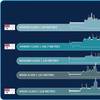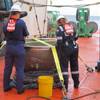IMO Urged to Provide Access to Efficiency Data
Shipping Fuel Transparency Will Lower Emissions and Cut Costs.
NGOs call on shipping industry regulator to drive down costs, trigger improved fuel efficiency and reduce ship GHG emissions through efficiency data transparency.
Transport & Environment, Seas at Risk and Carbon War Room are urging the International Maritime Organisation (IMO) not to withhold data on ship efficiency and fuel consumption. The call for action follows moves by some industry groups to undermine initiatives at the IMO and EU level that would make efficiency performance publicly available and require ships to report and publicise their energy efficiency data.
In submissions to the IMO’s environment committee (MEPC), Transport & Environment (T&E) and Seas at Risk (SAR) – both members of the Clean Shipping Coalition [1] – have drawn on research by the University of Gothenburg [2] which states that transparency is essential if the industry is to reduce its GHG emissions and develop a sustainable low-carbon future. The study prepared by Jessica Coria, associate professor at the Department of Economics, University of Gothenburg, states that: “Social and market pressure resulting from information disclosure can generate strong incentives for pollution control in a way that traditional enforcement tools may not be able to achieve.”
One of the principle barriers to the sector reducing its emissions is the lack of publicly available data on the energy performance of individual ships. The IMO’s MEPC plans to restrict access to the energy efficiency design index (EEDI) data on newly built ships. Some shipowners/operators claim that efficiency performance data is commercially sensitive and should remain confidential. However, this is in stark contrast to the experience of other industries; the publication of vehicle performance standards in the European car industry, for example, has led to average annual improvements in vehicle fuel efficiency of 4%. In the aviation industry, US carriers have been required to publish quarterly data on fuel consumption and other operational aspects since 1958.
Failure to make efficiency data transparent would be neither productive, nor in the best economic interests of the industry; freely available information is the key to promoting energy efficiency and driving down industry costs. Moreover the current situation, where some privileged actors pay for access to such data, distorts competition and divides the market between data ‘haves’ and ‘have nots’.
Disclosure of efficiency data ensures greater competition, prompting more calls for transparency from many shippers, cargo owners and operators. This is demonstrated by the increasing uptake of independent efficiency indices such as the Clean Cargo Working Group, the Clean Shipping Index and the A-G efficiency rating from RightShip and Carbon War Room. Indeed use of the A-G rating alone has been introduced as a policy by nearly 30%, representing 2 billion tons of cargo, of shipping’s non-containerised charter market.
T&E and SAR call on the IMO to recognise that a single source of official and certified data from the industry regulator would offer a more reliable and universal metric; one that would drive competition to increase efficiency across the industry.
John Maggs, president of the Clean Shipping Coalition and policy advisor on shipping and environment issues with Seas at Risk, said: “Transparency of efficiency data is needed to inform good policy making and is a win-win for the shipping industry and the environment. Transparency of data will help drive down industry costs, improve the functioning of the shipping market and lead to desperately needed reductions in ship GHG emissions.”
Bill Hemmings, shipping manager at T&E, said: “Energy performance data is an essential first step to reducing the sector’s emissions, which are predicted to treble by 2050 on a business-as-usual basis and threaten to undermine other global attempts at tackling dangerous levels of climate change."
Victoria Stulgis, senior associate at Carbon War Room’s shipping operation said: “Open data on efficiency is essential to achieving the sustainable reductions in carbon emissions our industry needs. Carbon War Room knows a lack of access to data is a major barrier to the take up of clean technologies, so we urge the IMO to deliver open access to EEDI data.”
Warwick Norman, CEO, Rightship, added: “The take-up of RightShip’s A to G efficiency rating is an example of the market moving faster than industry regulations. In 2012 we had three charterers using A-G in their selection process: now we have over 30 customers, including ports, terminals and banks, who factor energy efficiency into their vessel selection criteria. This collectively represents almost 240,000 login sessions to our online efficiency tool. Our experience demonstrates that if the IMO were to make efficiency data on newer ships freely available it would be used in vessel selection and therefore help reduce emissions of the world’s fleet.”














